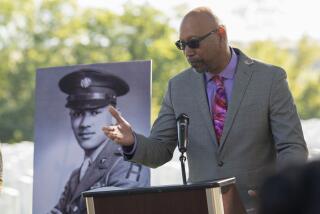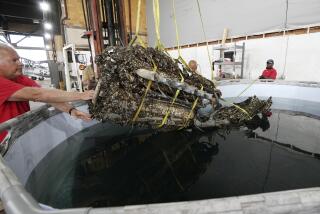One final mission for WW II pilots: Congressional recognition
- Share via
WASHINGTON — During World War II, volunteer pilots in the Civil Air Patrol, flying their own aircraft, patrolled the U.S. coast in search of German U-boats.
Seventy years later, Civil Air Patrol members are hoping to win long overdue congressional recognition of their service.
The Senate has voted to award the group a congressional gold medal. But those who support bestowing the nation’s highest civilian honor to the patrol members are still about 100 sponsors shy of the 290 needed to pass the measure in the House.
“This is our last chance to honor the few that are still alive,” John Swain, the Civil Air Patrol’s Washington representative, said in an interview.
It is one of a number of efforts to pay tribute to World War II-era group before it’s too late.
Congress has awarded gold medals to the Tuskegee Airmen; Navajo Code Talkers; Women Airforce Service Pilots, or WASPs; the first black Marines, known as the Montford Point Marines; and Japanese American members of the 100th Infantry Battalion, 442nd Regimental Combat Team, and the Military Intelligence Service.
Legislation has been introduced to award gold medals to the First Special Service Force, a U.S.-Canadian commando unit depicted in the movie, “The Devil’s Brigade,” and to troops who defended Bataan, Philippines, during World War II.
Sen. Tom Harkin (D-Iowa), who sponsored the Senate bill to award the gold medal to the Civil Air Patrol, said it would offer “long overdue recognition to a small group of people who answered the call to duty at our nation’s time of maximum danger.’’ The House bill was introduced by Rep. Bob Filner (D-San Diego).
The Civil Air Patrol was established in 1941, a week before the Japanese attack on Pearl Harbor, but gained a more critical mission after oil tankers and other supply ships were sunk off the U.S. coast by German submarines.
Volunteer pilots, flying in pairs, patrolled up to about 120 miles off the coast, often at low levels “because they needed to be able to spot the periscopes,’’ Swain said.
The planes were credited with 173 sub sightings and dropping bombs or depth charges on 57.
“We think we may have sunk two submarines,’’ Swain said.
“In 1943, German U-boat attacks ceased off the Atlantic coast of the United States,’’ Harkin recently told his colleagues. “One high-level German naval officer credited CAP with being the primary reason for withdrawal, saying, ‘It was because of those damned little red and yellow planes!’ ”
Twenty-six CAP pilots died and 90 planes were lost during the war.
After about 18 months, Swain said, the military took over the patrols.
“We were just told to stand down, got a letter of thanks and that’s about the only thank you that was sent out to our troops,’’ Swain said. The volunteers continued to perform search and rescue, target towing and pilot training and other missions, Swain said.
“Today, volunteer civilian members of the Civil Air Patrol, an auxiliary of the Air Force, conducts search and rescue and other missions.
ALSO:
Record New Mexico fire rages, but officials see signs of hope
Jerry Sandusky case: Judge lays down some ground rules for trial
Soda ban: New Yorkers don’t like idea, but they’re sweet on Bloomberg
More to Read
Sign up for Essential California
The most important California stories and recommendations in your inbox every morning.
You may occasionally receive promotional content from the Los Angeles Times.











